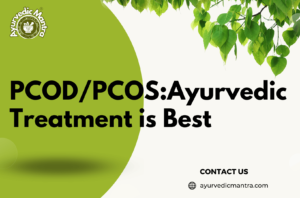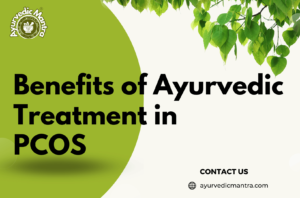
PCOD/PCOS: Ayurvedic Treatment is Best
Introduction Polycystic Ovary Disorder (PCOD) or Polycystic Ovary Syndrome (PCOS) is a common endocrine disorder affecting millions of women worldwide. It leads to hormonal imbalances,


Certain conditions can be confusing regarding women’s health due to their acronyms and overlapping symptoms. PCOS and PCOD are two terms that often create confusion. Are they the same or distinct conditions? This comprehensive guide will delve into women’s health to shed light on the differences and similarities between PCOS (Polycystic Ovary Syndrome) and PCOD (Polycystic Ovary Disease). By the end of this article, you’ll have a clearer understanding of these terms and how they impact women’s lives.
Before we explore the intricacies of PCOS and PCOD, let’s decipher their acronyms. PCOS stands for Polycystic Ovary Syndrome, while PCOD stands for Polycystic Ovary Disease. While the acronyms might sound similar, they refer to distinct medical conditions affecting women’s ovaries and hormonal balance.
PCOD, or Polycystic Ovary Disease, is a condition characterized by the presence of multiple small cysts on the ovaries. These cysts are immature follicles that have the potential to develop into eggs. However, in women with PCOD, these follicles may not mature and design as they should, leading to hormonal imbalances.
Polycystic Ovary Syndrome (PCOS) is a broader and more complex condition. While the name suggests the presence of cysts on the ovaries, it encompasses a range of symptoms and hormonal irregularities. In addition to ovarian cysts, PCOS may involve insulin resistance, irregular menstrual cycles, excessive androgen levels (male hormones), and fertility challenges.
While PCOD points explicitly to the presence of ovarian cysts, both PCOS and PCOD share some common symptoms, which can include:
Hormonal imbalance is a critical factor in both PCOS and PCOD. Insulin resistance, a hallmark of PCOS, can lead to elevated insulin levels, which in turn stimulate the ovaries to produce more androgens. These male hormones can disrupt the normal menstrual cycle and develop cysts in the ovaries. Similarly, PCOD is also linked to hormonal imbalances, contributing to its characteristic symptoms.
Diagnosing PCOS and PCOD involves a comprehensive assessment of symptoms, medical history, and, often, various diagnostic tests. These can include hormonal blood tests, ultrasound imaging, and a physical examination. Early diagnosis and intervention are crucial to managing these conditions’ symptoms and potential complications.
While medical treatment may be recommended, lifestyle changes can play a significant role in managing both PCOS and PCOD. A balanced diet, regular exercise, stress management, and sufficient sleep can improve hormonal balance and reduce symptoms. Additionally, medications and hormonal therapy prescribed by healthcare professionals can help regulate menstrual cycles and address specific symptoms.
For women with PCOS or PCOD planning to start a family, fertility can be a concern. These conditions can impact ovulation and menstrual regularity, making it essential to seek medical guidance if conception is a goal. Fortunately, advancements in medical technology and fertility treatments offer hope to women facing these challenges.
It’s important to note that PCOS and PCOD can have implications beyond the reproductive system. Hormonal imbalances associated with these conditions can influence overall health, potentially affecting cardiovascular health, metabolism, and long-term well-being.
In conclusion, while PCOS and PCOD share certain similarities, they are distinct conditions with their unique characteristics. PCOD revolves around ovarian cysts, while PCOS encompasses a broader spectrum of hormonal irregularities, often extending beyond the ovaries. Early diagnosis, lifestyle modifications, and medical intervention are essential in managing the symptoms and potential complications of both PCOS and PCOD. By understanding these conditions, women can take proactive steps toward prioritizing their health and well-being.
As we’ve explored the differences and similarities between PCOS and PCOD, it’s evident that a comprehensive approach to healthcare is crucial. If you suspect you may be experiencing symptoms related to either of these conditions, seeking guidance from a qualified healthcare professional is the first step towards effective management and improved quality of life. Remember, your health matters, and with the proper support, you can navigate the path to well-being with confidence and empowerment.
No, PCOS (Polycystic Ovary Syndrome) and PCOD (Polycystic Ovary Disease) differ. Although the acronyms sound similar, and both conditions involve hormonal imbalances and ovarian issues, they have distinct characteristics. PCOS encompasses a broader range of hormonal irregularities, including elevated androgen levels, insulin resistance, and irregular menstrual cycles. PCOD primarily refers to the presence of multiple small cysts on the ovaries.
PCOD stands for Polycystic Ovary Disease. It is a condition in which the ovaries develop multiple small cysts, immature follicles. These follicles may not mature as they should, leading to hormonal imbalances that can affect the menstrual cycle and other aspects of health.
PCOS stands for Polycystic Ovary Syndrome. It is a complex hormonal disorder characterized by multiple factors, including insulin resistance, elevated androgen levels, irregular menstrual cycles, and potential fertility challenges. While ovarian cysts are part of PCOS, the condition extends beyond just cysts.
PCOS and PCOD share common symptoms, such as irregular menstrual cycles, hormonal imbalances, acne, excess hair growth, and potential fertility issues. However, PCOS can also involve additional symptoms like insulin resistance, weight gain, and elevated androgen levels.
Diagnosing PCOS and PCOD involves a comprehensive approach. Healthcare professionals consider symptoms, medical history, physical examinations, hormonal blood tests, and ultrasound imaging. These diagnostic tools help differentiate between the two conditions and develop an appropriate treatment plan.
Yes, adopting a healthy lifestyle can significantly impact the management of both PCOS and PCOD. A balanced diet, regular exercise, stress management, and adequate sleep can help regulate hormones and alleviate symptoms. Lifestyle changes are often recommended alongside medical interventions.
PCOS and PCOD can affect fertility by disrupting ovulation and menstrual regularity. Women with these conditions may experience challenges in conceiving. However, many women can overcome fertility obstacles with proper medical guidance and treatments.
Yes, treatments are available for both PCOS and PCOD. Medical interventions may include hormonal therapy to regulate menstrual cycles, manage insulin resistance, and address other symptoms. Depending on individual needs, lifestyle changes, weight management, and fertility treatments are also options.
Yes, hormonal imbalances associated with PCOS and PCOD can impact overall health beyond reproductive functions. These conditions have been linked to increased risk of cardiovascular issues, metabolic disturbances, and long-term health implications.
Early diagnosis and management are crucial for both PCOS and PCOD. Timely intervention can help prevent or minimize complications, regulate hormonal imbalances, improve quality of life, and increase the chances of successful fertility outcomes.
Understanding the differences between PCOS and PCOD is essential for women’s health. If you suspect you may be experiencing symptoms of either condition, it’s advisable to consult a healthcare professional for accurate diagnosis and personalized treatment.

Introduction Polycystic Ovary Disorder (PCOD) or Polycystic Ovary Syndrome (PCOS) is a common endocrine disorder affecting millions of women worldwide. It leads to hormonal imbalances,

Introduction Losing weight is a journey that requires dedication, consistency, and self-care. While there are numerous weight loss techniques out there, not all of them

Polycystic Ovary Syndrome (PCOS) is a hormonal disorder that affects millions of women worldwide. It can lead to various health complications, such as irregular periods,

In recent years, Ayurveda, an ancient system of natural healing originating from India, has gained significant popularity as an alternative approach to treating various health

आजकल वजन बढ़ने और चर्बी की वृद्धि होने की समस्या एक आम समस्या बन गई है। बढ़ते वजन और अतिरिक्त चर्बी के कारण न केवल

प्रस्तावना: आजकल वजन बढ़ने और ओबेसिटी की समस्या एक आम समस्या बन गई है। बढ़ते वजन के कारण न केवल शारीरिक समस्याएं होती हैं, बल्कि
